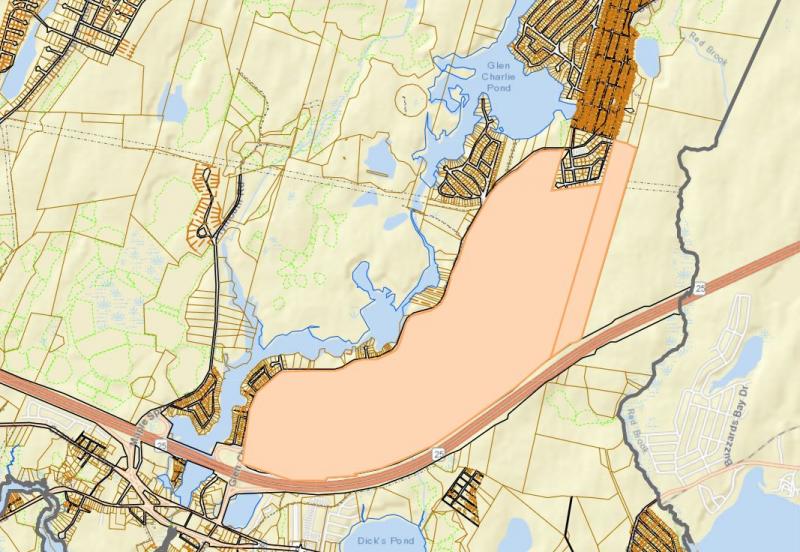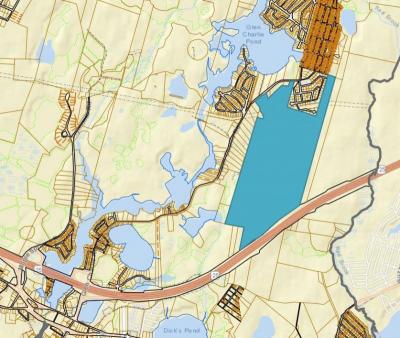What IS the Hospitality District? FAQs, answered
On Saturday, April 10, the voters of Wareham will be asked to approve a new Hospitality, Recreation and Entertainment District that covers 756 acres of land between Glen Charlie Road and Rte. 25.
The zoning proposal was created by the Notos Group and town officials, and has undergone more than thirty changes since it was first proposed.
The Notos Group is a family-owned company based in Quincy that developed the Granite Links Golf Course and Marina Bay, a large mixed-use development including apartments, assisted living, restaurants, shops and office space.
The company first made their interest in Wareham public in August 2019 with a proposal for a thoroughbred horse racing track and a slots parlor, along with a hotel. That proposal has since been largely abandoned, as the legal pathway that would allow for a slot parlor through state legislation fell flat.
They have not made any specific plans public, and in an April 2 interview, spokespeople insisted that they have no plans and cannot have any plans until after the zoning change has passed.
A number of conservation advocates have come out against the rezoning, including the Wareham Land Trust, Trout Unlimited, the Southeastern Massachusetts Pine Barrens Alliance, the Buzzards Bay Coalition, the Trustees, the Community Land and Water Coalition, the Sea Run Brook Trout Coalition, Wildlands Trust and the Northeast Wilderness Trust. The Herring Pond Wampanoag Tribe has also opposed the measure.
To read arguments for and against the zoning change, click here.
The complete text of the proposed Hospitality, Entertainment and Recreation District is attached to this article.
Where is the district? How big is it?
The proposed Hospitality, Recreation and Entertainment district includes 756 acres of land between Glen Charlie Road and Rte. 25, with the northernmost point of the district roughly near the 7-Eleven store.
The 275 acres referred to on the Wareham Wins website and in the Wareham Wins letter mailed to voters, both of which were funded at least in part by Notos, refers to the parcel of land the developers are interested in. That land is owned by the Graziano family, who operate a gravel pit on some of the land.
What is the condition of the land?
While some of the land is the site of a gravel pit, much of the land is forested. There are also several ponds and streams.
Currently, the land is zoned to allow only single-family homes on three acre lots.
What happens if the rezoning is approved?
If the rezoning is approved, the district would allow a variety of uses including hotels, conference centers, multiple family dwellings, hospitals and riding stables. All projects would have to include an “indoor and/or outdoor commercial recreation facility or place of amusement and residential uses.”
The district still requires projects on at least 100-acre parcels and would require all proposals to go through a special permit process with the Planning Board, which gives the town a fair amount of say about what is built.
Currently, the land is zoned to allow only single-family homes on three acre lots.
Any developments would likely need to be approved by several permitting authorities, although it is unclear at this point precisely which officials on the town, state, or federal level would have jurisdiction.
How many properties could be developed if this zoning change passes?
Aside from the 275 acre parcel that the Notos Group and at least one other developer are interested in, it appears there is only one other parcel that is big enough to qualify for development through the district. That site, located close to the intersection of Glen Charlie Road and Rte. 25, currently hosts cranberry bogs and a pond, and it's unclear what development would be possible there, or if the current owners have any intent to develop or sell.
The Notos Group has no connection to that land.
Ray Howell, a spokesperson for the group, said that in the Notos Group’s opinion, the Graziano land was the only parcel eligible to be developed through the new zoning district.
What happens if the zoning change doesn’t pass?
If the zoning change does not pass, the zoning will stay the same. Only homes on three acre lots would be allowed.
Wareham Wins states that if the zoning is not passed, “the properties will eventually be developed as high-density housing” — but it’s not certain that would be the case.
The Notos Group has no interest in building homes, and no developer has proposed building homes on the land.
“At some level, the only use for that land will be for three-acre minimum lot size housing. Unless you're willing to predict or I’m willing to predict that that private land is forever going to remain as a gravel pit, eventually it will be developed according to its underlying zoning,” said Jeffery Tocchio, the Notos Group’s attorney.
Tocchio said that he would consider the up to 90 homes that could be built there as “high-density” even though they would be on three acre lots.
Town Planner Ken Buckland said it is possible that a developer might be able to put in a 40B apartment complex or other project, but no such project is currently proposed.
Although multifamily housing is not allowed under current zoning, it would be an allowed use if the zoning change passes.
How many votes are needed to pass the zoning change?
It is still unclear whether the project would need to be approved by two-thirds of voters or by a simple majority. Historically, all zoning changes have required a two-thirds approval.
Following a recent change in state law, zoning changes that include measures like allowing certain mixed-use developments, increased housing density or allowing “in-law” apartments can be approved by a simple majority vote.
The law does not specify who has the power to determine what vote threshold is needed to pass a particular zoning change.
The Planning Board has been tasked with making that determination, and will do so at their Monday, April 5 meeting, which will also include a public hearing on the zoning proposal.














